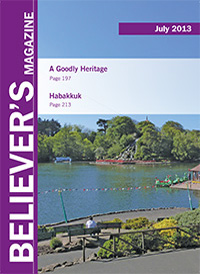Each of the four gospels has unique features which determine its character. The second of these four accounts of the life and death of the Lord Jesus is generally known as the "Servant Gospel", presenting the Lord Jesus as the "Servant of Jehovah" (see Is 42.1-4; 49.1-4; 50.6,9; 52.13-15). Speed of action characterises Mark's account, showing the reader that the Lord, like any good servant, valued time and used it wisely.
The Lord Jesus, however, as the Servant of Jehovah, not only showed a good example, but taught others how to follow Him. Two matters are seen clearly in the early verses of Mark's text which speak of the Lord. We learn that the preparation of the servants is a key part in the work of God. First, His work was prepared for Him. Before His birth (vv.2-3) and before His public debut (vv.4-8) the way was set out by John Baptist. But second, the servant was prepared for the work (vv.9-13) in the baptism by John Baptist and in His time in the wilderness where He overcame the Adversary. We must not forget that that the work is prepared for servants today just as they also are prepared for the work to which they are called.
But the reader cannot overlook the promise to the servants whom He chose. As He walked by the Sea of Galilee the Lord spoke to four fishermen: "Come ye after me, and I will make you to become fishers of men". Note that when Matthew writes of the same incident he records the words, "I will make you fishers of men" (Mt 4.19). The "Servant Gospel" includes the words "to become" emphasising that the work to which they are being called will require teaching and it would be the Lord who would teach them. Lesser men would have asked a carpenter how he could be qualified to teach these competent fishermen how to fish. The "Master Teacher" will carry out the greatest instruction and training programme that has ever been known.
The promise, however, was that they would "become" skilled in this work and, on listening to what the Lord said, they "forsook their nets" (v.18) and "went after him" (v.20). The call, clarion-like in its tone, still goes out today. The need for "fishers of men" is great. Some will be fitted to preach the gospel powerfully to many, some to deal with individuals, some to work publicly, some privately. The call that first reached four is now for all who have believed His Word.
Note also the proclamation to the servants. The key to this was the statement, "Come ye after me" (v.17), which required sacrifice. The fishing businesses were to be laid aside, and they were. Three of these men had met the Lord Jesus before this momentous day, as is recorded in John 1.35-42. Others would be gathered and be taught at the feet of the greatest Teacher the world has ever seen. He would mould them, change them, give them understanding that they had never heard before. He would teach them verbally as they listened. He would teach them by His own example. They would be sent to preach and put into practice what He had taught them. There were times when they would fall short and He would correct them. They would discuss who would be the greatest. When hearing Him pray they would realise their shortcomings as one of them asked, "Lord, teach us to pray" (Lk 11.1). They would see repentant souls becoming His followers; they would look on as those who were dead or dying were restored to life. By His word and His touch the incurable were healed. They would follow Him to Calvary and meet Him again after His death and resurrection. Having met Him and followed Him, all of the twelve, apart from one traitor, would stay faithful. After His resurrection their lives would be devoted to preaching and teaching the message that He had proclaimed.
Today the call is as great as ever! Not for us to see demons cast out or the dead raised. The Scriptures tell us clearly that such is not for today. But the need is great! Solemnity must mark the message. The gospel preacher must warn those who refuse the message of salvation. They must encourage those who accept it, as they come to know and to love the Lord who saved them and gave them eternal life. The call that was first heard by four fishermen on the shores of Galilee so many years ago still rings out powerfully: "Come ye after me, and I will make you…".









